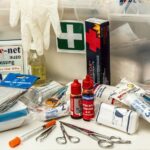Once you have accepted your addiction, it is time to prepare for Drug rehab in Phoenix. Being prepared prior to entering rehab is critical; Phoenix residents can beginning rehab greatly by attending Spring Board Recovery residential (or outpatient) addiction treatment centers.
If you have never attended rehab before, it can be overwhelming not knowing what to expect. Although taking the right steps can make the transition smoother, starting your journey towards recovery with the right mindset will make a big difference. Here are some tips for those starting their rehabilitation program for the first time.
Before beginning rehab, make sure your family and friends know your intentions.
Informing your family and friends of your plans to attend rehab can be difficult. Although shame and embarrassment may arise, chances are good that they will support you and be proud of what you have accomplished.
Children are an essential part of recovery. While you don’t have to go into specifics, telling your kids that you will be away for treatment will help them prepare mentally and emotionally for the time away. Additionally, let them know where they will stay and for how long; this will prevent them from being shocked by your sudden departure.
It is possible to stay connected with family and friends during rehab. You can reach them via phone calls or video conference, plus you have visiting hours where family can keep an eye on you – especially helpful for children who feel abandoned without their parents.
All Work Obligations Should Be Fulfilled
There are many responsibilities in life; we owe debts to family, friends and employers. If these responsibilities become overwhelming when entering rehab, it’s essential that you address any outstanding matters beforehand.
It is essential that your employer know that you will be taking time off work for medical treatment. Failure to notify them could result in termination from your job. Your job is legally protected under The Family and Medical Leave Act, which grants Americans 12 weeks of leave per year for such reasons.
Your employer should be supportive of you seeking assistance and delighted that you do so. Your recovery journey will be smoother with an employer who values both you as a person and values your work ethic; they may even value honesty in you. They may be able to make temporary adjustments to your schedule or find someone else to fill in until you return to full productivity.
Secure Legal and Financial Freedom
Once you start treatment, it can be stressful to consider any loose ends – financial or legal. In order to fully engage during this time in rehab, focus on staying present. One of the best ways to prepare is by tying up any loose ends ahead of time.
Bills can be an annoying distraction. That is why it is essential to take care of all financial obligations before going into rehab, so that you aren’t stressed about overdue bills during treatment. Put them on autopay or ask a trusted family member or friend to pay them for you; this way, there will be no stress from worrying about past due bills during recovery.
Be certain to have all the essential items on hand.
No matter if you are attending a long-term inpatient program or just need to commute between your home and the program, make sure you know all the rules before entering. Rehab centers have specific policies regarding what can and cannot be brought inside, which must be observed.
When packing for rehab, only bring what is absolutely necessary. Rather than bring back all your memories of home, opt for enough clothes and not bring everything. You don’t need to bring the entire family album – just a few favorites. Here are some essential items to bring with you:
Bring along a notebook or journal, paperback books if you enjoy reading, any current medications and enough toiletries to last the duration of your stay. Also don’t forget to bring along names and addresses of people who are important in your life!
Remind yourself that you are responsible for your own treatment and recovery. When considering rehab, focus on focusing on recovery and growth rather than anything else. Once home, you will likely find everything that was taken away with you – including all of your favorite items!
Spend quality time with those you cherish most beginning rehab
Inpatient programs may mean you won’t see your family for at least a month. Therefore, it is recommended that you spend quality time with those you cherish before entering rehab. Addiction has the potential to have a devastating effect on those closest to you even if it wasn’t intentional. Spending quality time together shows your loved ones that you value them and are dedicated to them.
Your mental health can be enhanced by spending time with family and friends before you depart. Rehabilitation facilities often have unfamiliar people, so having a support network in place before hand helps prepare you for the experience. Making sense of what’s going on during treatment and remembering memories from home helps alleviate homesickness when being away from familiar surroundings.
Beginning Rehab Send a Letter to Yourself
As we age, our perspectives evolve. After completing a rehabilitation program, you may find that you have completely transformed from the inside out; therapy helps patients combat negative thoughts and behaviors by changing perspective. It’s an amazing thing that rehabilitation offers!
Writing a letter to yourself before going into rehab can serve as a reminder of how far you’ve come. Reading it again, however, might reveal that your emotional state has altered significantly. This could indicate an underlying shift in how you perceive yourself.
Create a list of goals you hope to accomplish after rehabilitation.
Another effective way to prepare yourself for rehab is making a list. Without one, it could be easy to feel lost at the end of your stay. By making this list, you have already asked yourself many questions such as: what are the most effective ways to enter rehab for drug addiction? Which treatment option would work best for me?
Instead of questioning what the next step is, take time to plan it. Perhaps you have a dream trip planned with family and friends. Or perhaps you have spent some time researching or brainstorming sober activities for after rehabilitation. Having an organized list can be invaluable when feeling lost or overwhelmed with your new drug-free or alcohol-free lifestyle.





